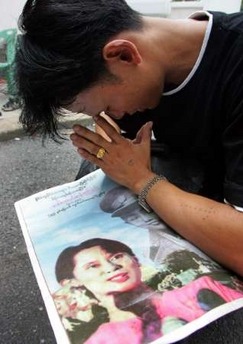LADY OF THE LAKE
The question of how to deal with tyrants is a thorny one. Four responses are common. One reacts by taking up arms against the oppressors; anotfher offers no resistance and tries to exist as best one can; one becomes part of a passive resistance movement in the manner of Gandhi and Martin Luther King; or one looks to the world to apply embargoes and political pressures to weaken the regime.

(courtesy: Base Images)
In the March edition of “Vogue,” Elizabeth Rubin paints a graphic picture of the challenges facing Aung San Suu Kyi, leader of the democratic movement in Burma who was recently released from years of house arrest, having been cut off from all forms of communication with the outside world except for a single radio. Now that she’s released from her prison/home beside Inya Lake, her people are looking to her leadership in their struggle against the a military tyrant, Than Syhwe, 78 — a man described as a psychopath in the manner of North Korea’s Kim-il-sung. But unlike Nelson Mandela, whose release came after South Africa had been weakened by labor resistance and economic pressures, similar efforts leveled against Burma have had no impact. The country’s leaders seem to thrive on isolation and have even built a capitol deep in the jungle where few travel. As for attempts to weaken the economy, in that medieval world where the land is tilled by oxen, it barely exists.
How Aung San Suu Kyi is to accomplish the liberation of her people is a puzzle. Unlike the heroine of Tennyson’s Lady of the Lake, she has no magical powers, only a set of ideals which some in her country have begun to question. Her people want her to lead but there is no consensus about the direction. Some want her to speak out against the general and raise a resistance; others prefer to negotiate. Still others hope she will take no action that will lead to further oppression while others complain she has done nothing to put rice on their tables. Worse, those who have been closest to her argue she has been cut off from the world too long and no longer understands how things work — a complaint they raise from a distance as they have not dared to rally round her for fear of reprisals.
To the general’s credit, he has succeeded in fomenting doubt about Aung San Suu Kyi’s ability to lead. He has shrouded her in a mist of whispers and attempted to make her a pariah among her followers. Given their fear, what else can she be but a constant and steady beam reminding them of what is right? Without principles the road to freedom is unclear. At the moment, Aung San Suu Kyi is doing what she can. She is setting the standards. If others lack the courage to follow, that is their choice, not hers. She has no magic other than the people’s trust in her.